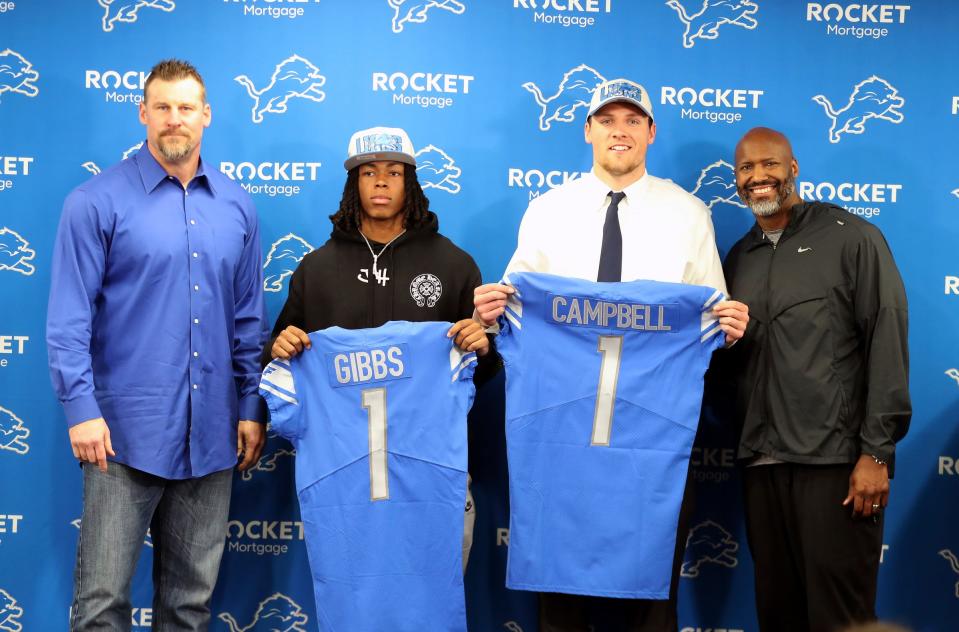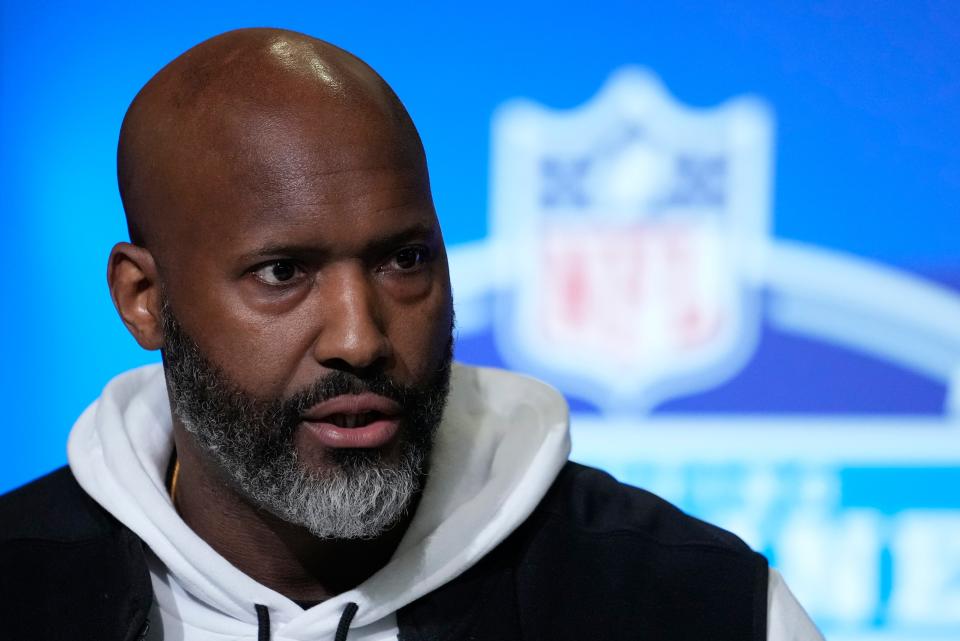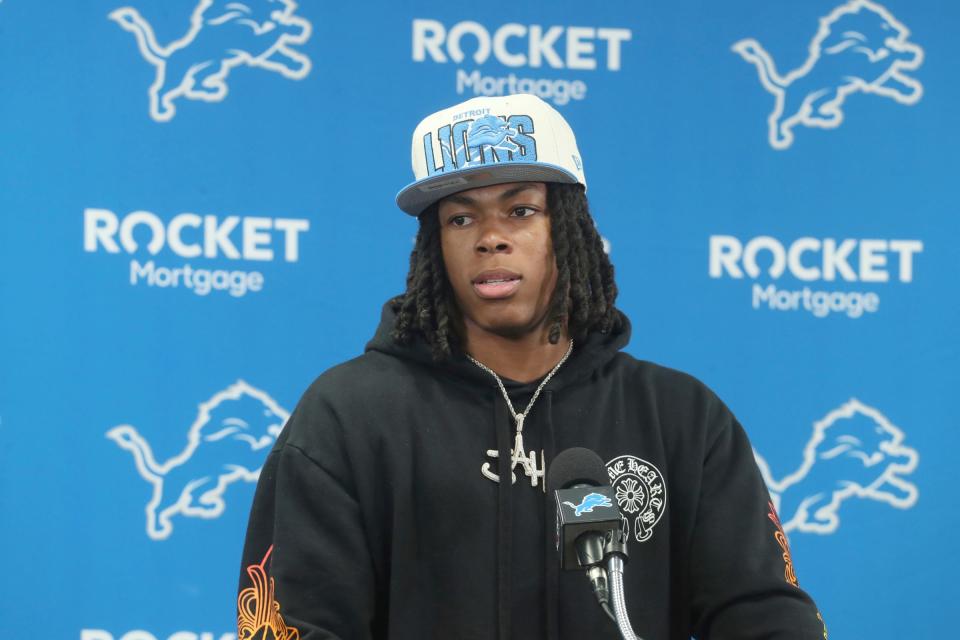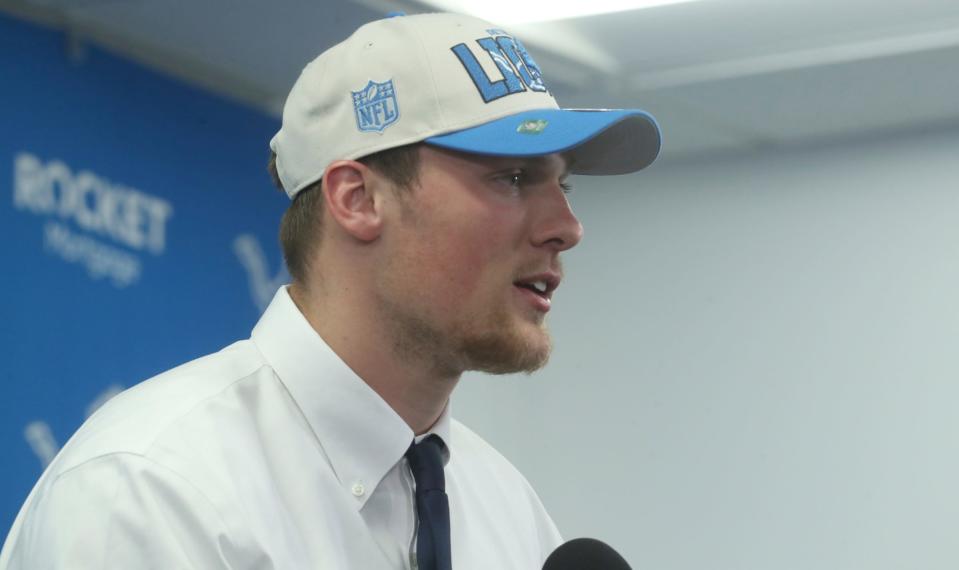The appeal of the NFL draft is that it’s shopping with someone else’s money. You get to cheer, criticize, yell “Buy!” or “Don’t buy!” and it doesn’t cost you a thing.
The one person whom it costs — and therefore the only one who matters — is the general manager. In the case of Detroit Lions, that’s Brad Holmes. It’s his job. It’s his “Supermarket Sweep.”
And therefore, it’s his brain you either trust or don’t trust to determine if the Lions’ three-day shopping spree was a success.
“We’re absolutely thrilled with how tonight went,” Holmes told the media after Thursday’s first round, in which he:
1. Passed on defensive lineman Jalen Carter;
2. Traded back from No. 6 to No. 12;
3. Selected a running back with his top pick;
4. Went for an off-ball linebacker with No. 18.

Draft pundits weren’t as “thrilled” as Holmes was. They scratched their heads. They handed him “C” grades. Why take Alabama’s Jahmyr Gibbs that high, they asked? Why waste your top pick on a running back — especially when you just signed a starter, David Montgomery, as a free agent?
Why not select Carter, whom, behavior aside, everyone agreed was the biggest defensive talent in the draft, a place where the Lions desperately need help? And why use the No. 18 picks on Iowa’s Jack Campbell, who won’t impact the defense as much as Carter could have, and seemed in no danger of not being there even 10 picks later?
SHAWN WINDSOR: Brad Holmes said he was willing to get ripped for his NFL draft. And he is.
Holmes, for his part, had little use for critics or mock drafters.
“They do bring value, but that doesn’t really move me,” he said.
A different kind of ‘draft for fit’
On the second night, Holmes got less criticism, possibly because he left everyone so dizzy. He was like Bob Barker with Doors No. 1, 2 and 3.

First he used his newly acquired second-round pick from a trade the night before on a tight end, Iowa’s Sam LaPorta, who wasn’t even the highest ranked at his position, then made four more trades, going up to take a defensive back , Alabama’s Brian Branch, who pundits predicted as a first-rounder, and going back to eventually take a quarterback, Tennessee’s Hendon Hooker, in the third.
When the smoke cleared, Holmes had used two top-18 picks on a running back and a linebacker, both of whom might have been there into the 20s, used a second-round pick to steal a guy that was supposed to have gone the day before, and used a third-round pick on a quarterback who’d been a Heisman Trophy candidate until an injury.
Dizzy yet?
“We just take the best players for us,” Holmes explained. “I’ve always said that’s what we’re going to do, and we find players that fit us and what we’re about, what we’re about as a culture from a culture-standpoint, from a character-standpoint, from an intangible standpoint, from an intelligence standpoint.
“The talent is one thing, but these players fit us. That’s why we’re thrilled about them.”
JEFF SEIDEL: Lions emerged from the NFL draft with a roster in great shape. Now it’s time to win
Let the past predict the future
Now it’s always funny to read post-draft analyses. They are all over the place, mostly because there is no way to prove them right or wrong. If the media is inclined to think highly of the local brass, the thumbs up. If they think their front office is a bunch of bozos, the thumbs go down.
My opinion is no more valuable than anyone else’s. But having covered these things for more than 30 years, I tend to use experience rather than emotion.
So when I see a promising SEC running back taken high, like Gibbs, I look back three years ago to D’Andre Swift, another promising SEC running back the Lions took pretty high (35th overall.) He was supposed to be an answer. Except he couldn’t stay healthy, and just got traded to the Eagles for a fourth-round pick.

So a second-round pick was lost for a fourth-round pick. And his replacement cost the Lions their top first-round pick.
Hmm. Ok.
Then I looked at LaPorta, taken with the third pick of the second round. That’s still pretty high for a tight end. And I remember four years ago, when the Lions used a ridiculously high No. 8 pick for another Iowa tight end named TJ Hockenson. He played well here, but midway through last season the Lions traded him away for a second- and third-round draft pick.
So a high first-rounder was lost for a second-round pick, which the Lions just used on a new tight end who now has to start from scratch at the same position.
That doesn’t scream progress to me.
A world of ‘what ifs’
Now, I know, the current Lions brass will say those players were acquired under a different regime, the Bob Quinn era, and they cannot be held responsible for mistakes of the past. They’re right. But fans don’t look at it that way. Fans don’t root for regimes, they root for a team, and if that team keeps going one step forward, one step backward, they get frustrated.
Running backs, it’s true, don’t tend to last very long in the NFL, even the ones you love out of college. Ki-Jana Carter. Jamal Anderson. Maurice Jones-Drew. Heck, closer to home, how about Kerryon Johnson, the Lions second-round pick five years ago? We raved about him.
He’s looking for a job now. He’s only 25.
On the other hand, what if Jahmyr Gibbs is the next Deebo Samuel?
Yes, Holmes deserves the benefit of the doubt, given how well last year’s draft class worked out. And he’s right when he says other factors like interviews, character, and salary cap of other players all factor into his decisions, decisions thankfully we don’t have to make.

You do wonder if Illinois star cornerback Devin Witherspoon hadn’t been snatched one pick earlier by Seattle, if the Lions would have stayed at No. 6 and took him.
Or if Kentucky quarterback Will Levis hadn’t been snatched one pick earlier — thanks to a trade by the Titans — if the Lions would have gone for him with the 34th pick, and possibly had a quarterback for the future.
In both cases, you could argue that those were greater impact players defensively and offensively than Campbell or Hooker. And maybe Holmes should have tried to insure their acquisition.
He shops, we drop
But then we’d likely be quibbling over something else. In the end, the Lions replaced a running back, replaced a tight end, and replaced a defensive back (Branch in place of Jeff Okudah, the former first-rounder whom they traded for a fifth-round pick.)
They got a new backup quarterback who may or may not develop into a starter. And they got a defensive lineman from Western Kentucky and an offensive lineman from William and & Mary, neither of which is what you’d call a major program. And with the seventh-round pick, the Lions took North Carolina wide receiver Antoine Green.
Bottom line: we’ll see. We get way too emotional about the Lions, good and bad. For all the hype, they are an average team right now, with a bad defense, who lost five of their first six last year then won five of their last six, albeit largely against losing teams.
They just shopped in the supermarket, and it was fun to watch them rack it up without it costing us a penny. But in the end, either Holmes guesses right or guesses wrong. It’s his basket. It’s his credit card. The rest of us are just in the parking lot, watching him load up the station wagon and drive towards minicamp.
Contact Mitch Albom: [email protected]. Check out the latest updates with his charities, books and events at MitchAlbom.com. Follow him on Twitter @mitchalbom.
This article originally appeared on Detroit Free Press: Mitch Albom: Detroit Lions try to fix past mistakes in NFL draft